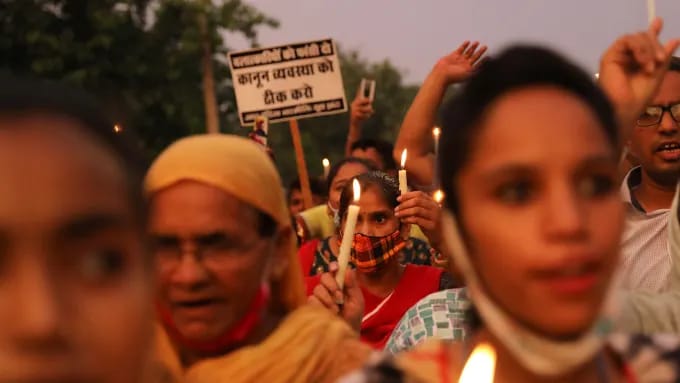
It’s not marital rape: Court rules against wife who sued husband for forced ‘unnatural sex’
A lady who accused her husband of engaging in "unnatural sex" had her complaint dismissed by an Indian judge.
The judge declared that under Indian law, a husband cannot force his wife to participate in sexual activities.
The Madhya Pradesh High Court's decision last week brought attention to an Indian legal loophole that exempts married couples who rape each other as long as the victim is over the age of 18, according to CNN.
According to the Madhya Pradesh High Court judgement, the woman informed police that shortly after they were married in 2019, her husband visited her home and engaged in "unnatural sex," which is punishable by Section 377 of the Indian penal code.
Before the Supreme Court decriminalised homosexuality in 2018, same-sex couples who had consensual sex were typically prosecuted for non-consensual "carnal intercourse against the order of nature with any man, woman, or animal."
The woman further claimed that her husband had threatened to divorce her if she notified anybody about the alleged "multiple occasions" that the conduct had occurred. The court heard that after telling her mother, she eventually came forward and that mother pushed her to make a lawsuit in 2022.
With the help of his attorney, the husband refuted his wife's allegation, arguing that since they were married, whatever "unnatural sex" they had was not illegal.
Judge Gurpal Singh Ahluwalia emphasised in his ruling that India's exemption from marital rape laws—a holdover from British colonialism that persists more than 70 years after independence—do not criminalise a man forcing sex on his spouse.
"The wife's consent becomes irrelevant when a rape involves the insertion of a penis in a woman's mouth, urethra, or anus, and if the act is performed with his wife and the victim is not younger than fifteen years old. Thus far, marital rape has not been acknowledged, the judge stated.
The Supreme Court of India raised the age of consent for marriage to fifteen to eighteen in a landmark judgment in 2017.
According to the court judgement, the woman also claimed that her in-laws had harassed her physically and psychologically "because the dowry demand was not fulfilled." There is an ongoing trial.
Ahluwalia's comments have sparked debate on how women are treated in India, where they are still vulnerable to discrimination and abuse in a country with a strong patriarchal culture.
Although the 1.4 billion-person largest democracy in the world has made great progress in passing legislation to better protect women, advocates and attorneys claim that because of its unwillingness to make marital rape a crime, women are not adequately protected.
17.6% of more than 100,000 women ages 15 to 49 who participated in the Government of India's 2019–2021 National Family Health Survey reported that they found it difficult to tell their husbands no when they didn't want sex, while 11% thought husbands were justified in hitting or beating his wife if she refused.
while 11% thought husbands were justified in hitting or beating his wife if she refused.
According to the study, which looked at data from three public hospitals in Mumbai between 2008 and 2017, out of 1,664 rape survivors, no police reports of rape were made. Ten of those women claimed to have been raped by a former spouse or partner, and at least eighteen of those women reported marital rape to the police.
According to the article, four women were informed by the police that there was nothing they could do because marital rape was not a crime.
Efforts to amend the law have been made over the years, but activists have faced resistance from conservatives who contend that government meddling might end the Indian custom of marriage.
A legal challenge against the statute has been making its way through the nation's courts; in 2022, the Delhi High Court handed down a divided decision on the matter, which led attorneys to submit an appeal with the Supreme Court of the nation, which is currently awaiting hearing.





